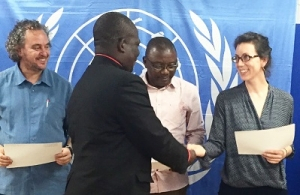
Human Rights Clinic students Jacob Bogart ’18, Anjli Parrin ’17, and Naomi Prodeau ’17 work with advocates, lawyers, investigators, and forensic anthropologists in the Central African Republic.
October 20, 2016, NEW YORK – The Columbia Law School Human Rights Clinic traveled to the Central African Republic (CAR) this summer to support local actors’ efforts to investigate human rights violations and war crimes using forensic science. The Clinic co-hosted an expert workshop on the use of forensic science for mass grave investigations and the analysis of human remains, in collaboration with the Argentine Forensic Anthropology Team and the University of Bangui Centre for Human Rights and Democratic Governance.
“Thousands have been killed during the crisis in CAR, which began in December 2013. Serious human rights violations and war crimes were committed, and many people were thrown into mass graves, wells, or latrines. Additionally, many of those killed were buried very quickly during the conflict,” said Professor Augustin Kongatoua Kossonzo, the Dean of the University of Bangui Faculty of Law, who founded the University’s new human rights center this year, the first of its kind in CAR. “Increased access to forensic expertise will help improve reconciliation and justice in CAR.”
To help facilitate the workshop, Human Rights Clinic students Jacob Bogart ’18, Anjli Parrin ’17, and Naomi Prodeau ’17 traveled to Bangui with Professor Sarah Knuckey, Director of the Human Rights Clinic and Co-Director of the Human Rights Institute. The Clinic was joined by Dr. Luis Fondebrider, an internationally renowned expert in forensics and human rights and president of the Argentine Forensic Anthropology Team (EAAF).
“Forensics can assist families to identify their loved ones, facilitate a dignified burial, and gather evidence for criminal prosecutions,” said Dr. Fondebrider, who has carried out mass grave and forensic investigations in over 35 countries. “The workshop aimed to share the experience of forensics in other countries, and to discuss how CAR investigators, judges, and NGOs could use and develop that expertise.”
The workshop was the first step of a larger project aimed at increasing CAR experts’ access to forensic trainings, and to assist in carrying out scientific investigations of serious human rights violations. It brought together over 40 participants from CAR government ministries, judges, investigators, doctors, academia, national human rights NGOs, and representatives from the United Nations. The UN Peacekeeping Mission in CAR, MINUSCA, also provided support to the expert workshop.
“By bringing together key stakeholders, the workshop explored the gaps, opportunities, and challenges to using forensics in investigations in CAR,” said Professor Sarah Knuckey. “In the context of recent efforts to increase accountability for serious crimes, especially through the creation of the CAR Special Criminal Court, the discussions enabled participants to strategize how to best to use scientific evidence to promote families’ needs and accountability.”
During the workshop, the Human Rights Clinic provided an overview of the applicable international legal framework governing the right to life and the duty to investigate killings. The Clinic’s presentation focused on the standards in the recently redrafted ‘Minnesota Protocol’—international guidelines on investigating killings. The Protocol was revised under the mandate of UN Special Rapporteur Christof Heyns, with the advice of Professor Knuckey and the Clinic.
Naomi Prodeau ‘17 was a member of the student team that provided legal research support to the Protocol during its redrafting. “Witnessing both the drafting of the legal framework in Geneva and then discussions of its practical application to investigate crimes in CAR enabled me to see how all the considerations that factored into redrafting such an important legal document materialised, so that it could be effectively relied upon and prove a useful tool," said Prodeau.
Workshop participants stated that an increased use of forensics would be critical to increasing the quality of evidence introduced in the judicial process, and to minimizing the reliance on purely testimonial evidence. Additional training is needed for investigators collecting and analyzing forensic evidence, and also for judicial authorities who would interpret and use it. The participants further stressed the necessity of ensuring that there is a proper legal and regulatory framework in place for forensics.
“The Human Rights Clinic trains students to integrate multi-disciplinary approaches to human rights research, advocacy, and lawyering. Working with experts from backgrounds in health, anthropology, security, forensics, law, and humanitarian work taught me what this looks like in practice,” said Jacob Bogart ’18.
The Human Rights Clinic has been working with human rights and humanitarian NGOs in the CAR for the past two years. In addition to the forensic science work, the Clinic works with NGOs on investigations, reporting, advocacy, and training related to women’s rights issues and the right to education in the context of the conflict. The Clinic will visit the CAR again this semester to continue this work.
# # #
The Human Rights Clinic is an intensive year long course directed by Sarah Knuckey, the Lieff Cabraser Heimann and Bernstein Clinical Associate Professor of Human Rights and the faculty co-director of the Human Rights Institute at Columbia Law School, as well as by Senior Clinical Teaching Fellow Benjamin Hoffman. The Clinic brings together human rights work, student education, critical reflection, and scholarly research. Students are trained to be strategic human rights advocates, while pursuing social justice in partnership with civil society and communities, and advancing human rights methodologies and scholarship. For more information, visit http://web.law.columbia.edu/clinics/human-rights-clinic.
